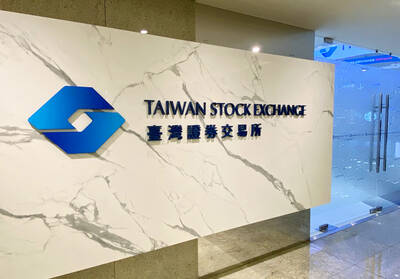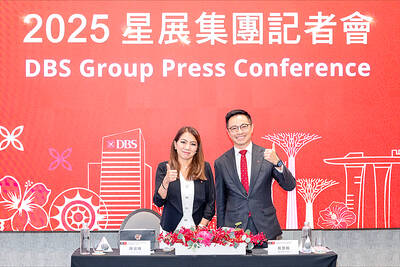E Ink Holdings Inc’s (元太科技) revenue would take a hard hit this month, as the firm was forced to halt the production of e-paper display modules at its facility in China amid COVID-19 containment measures, the firm said yesterday.
The world’s sole supplier of e-paper displays said that it temporarily shut down a plant in China’s Yangshou earlier this month amid an outbreak of COVID-19 in the city.
With new infections receding, the outbreak is increasingly under control, it said.
Despite the interruption, E Ink said that it is confident that its net profit for the whole of this year would increase from last year, thanks to robust customer demand for e-paper displays used in e-readers and e-notes following the introduction of color e-paper displays.
US retail giant Walmart and other international retailers are increasingly replacing traditional paper shelf labels with electronic labels equipped with E Ink technology.
“We expect that the factory shutdown would, to a certain degree, effect revenue in August,” E Ink chairman Johnson Lee (李政昊) told investors during a teleconference.
“However, one thing is positive: Customers’ orders are quite stable,” Lee said. “We need to push back shipments. Hopefully, we can catch up with all shipments later after the city reopens.”
E Ink said that demand has improved in the second half of this year, compared with the first half.
E Ink is expanding capacity to cope with rising customer demand, with three new production lines set to start operation by the end of this year and another one next year.
The firm posted quarterly net profit of NT$1.39 billion (US$49.7 million), up about 43 percent year-on-year from NT$976 million in the second quarter of last year.
Earnings per share jumped to NT$1.23 last quarter from NT$0.86 a year earlier, it said.
On a quarterly basis, net profits expanded 18.8 percent from NT$1.17 billion, or NT$1.03 per share.
During the first two quarters, net profits jumped 45.45 percent annually to NT$2.66 billion, the biggest half-year profit in 10 years.
However, investors voiced concern over a drastic decline in gross margin, which was down to about 41 percent last quarter, compared with 50 percent in the first quarter and 42.36 percent in the second quarter last year.
E Ink said that high key component costs caused the decline, adding that costs of flat panels and chips soared last quarter.
The company decided not to pass the costs to customers last quarter, but it would not rule out the possibility of raising prices to ensure profitability, E Ink said.

Taiwan Semiconductor Manufacturing Co (TSMC, 台積電) secured a record 70.2 percent share of the global foundry business in the second quarter, up from 67.6 percent the previous quarter, and continued widening its lead over second-placed Samsung Electronics Co, TrendForce Corp (集邦科技) said on Monday. TSMC posted US$30.24 billion in sales in the April-to-June period, up 18.5 percent from the previous quarter, driven by major smartphone customers entering their ramp-up cycle and robust demand for artificial intelligence chips, laptops and PCs, which boosted wafer shipments and average selling prices, TrendForce said in a report. Samsung’s sales also grew in the second quarter, up

LIMITED IMPACT: Investor confidence was likely sustained by its relatively small exposure to the Chinese market, as only less advanced chips are made in Nanjing Taiwan Semiconductor Manufacturing Co (TSMC, 台積電) saw its stock price close steady yesterday in a sign that the loss of the validated end user (VEU) status for its Nanjing, China, fab should have a mild impact on the world’s biggest contract chipmaker financially and technologically. Media reports about the waiver loss sent TSMC down 1.29 percent during the early trading session yesterday, but the stock soon regained strength and ended at NT$1,160, unchanged from Tuesday. Investors’ confidence in TSMC was likely built on its relatively small exposure to the Chinese market, as Chinese customers contributed about 9 percent to TSMC’s revenue last

Taiwan and Japan will kick off a series of cross border listings of exchange-traded funds (ETFs) this month, a milestone for the internationalization of the local ETF market, the Taiwan Stock Exchange (TWSE) said Wednesday. In a statement, the TWSE said the cross border ETF listings between Taiwan and Japan are expected to boost the local capital market’s visibility internationally and serve as a key for Taiwan becoming an asset management hub in the region. An ETF, a pooled investment security that is traded like an individual stock, can be tracked from the price of a single stock to a large and

Despite global geopolitical uncertainties and macroeconomic volatility, DBS Bank Taiwan (星展台灣) yesterday reported that its first-half revenue rose 10 percent year-on-year to a record NT$16.5 billion (US$537.8 million), while net profit surged 65 percent to an unprecedented NT$4.4 billion. The nation’s largest foreign bank made the announcement on the second anniversary of its integration with Citibank Taiwan Ltd’s (花旗台灣) consumer banking business. “Taiwan is a key market for DBS. Over the years, we have consistently demonstrated our commitment to deepening our presence in Taiwan, not only via continued investment to support franchise growth, but also through a series of bolt-on acquisitions,” DBS